Human Nature
For Bentham, morals and legislation can be described scientifically, but such a description requires an account of human nature. Just as nature is explained through reference to the laws of physics, so human behaviour can be explained by reference to the two primary motives of pleasure and pain; this is the theory of psychological hedonism.
There is, Bentham admits, no direct proof of such an analysis of human motivation--though he holds that it is clear that, in acting, all people implicitly refer to it. At the beginning of the Introduction to the Principles of Morals and Legislation, Bentham writes that "[n]ature has placed mankind under the governance of two sovereign masters, pain and pleasure. It is for them alone to point out what we ought to do, as well as to determine what we shall do. On the one hand the standard of right and wrong, on the other the chain of causes and effects, are fastened to their throne.
They govern us in all we do, in all we say, in all we think: every effort we can make to throw off our subjection, will serve but to demonstrate and confirm it". From this we see that, for Bentham, pleasure and pain serve not only as explanations for action, but also define one's good. It is, in short, on the basis of pleasures and pains, which can exist only in individuals, that Bentham thought one could construct a calculus of value.
Related to this fundamental hedonism is a view of the individual as exhibiting a natural rational self-interest-- a psychological egoism. In his "Remarks on Bentham's Philosophy," (1833) Mill cites Bentham's The Book of Fallacies (London: Hunt, 1824, pp. 392-3) that "[i]n every human breast... self-regarding interest is predominant over social interest; each person's own individual...


